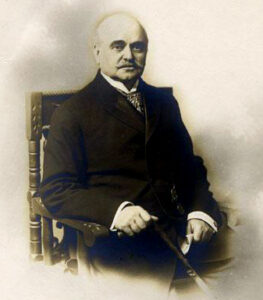Written by Cheri Todd Molter and Kobe M. Brown
On October 22, 1898, Edward Joseph Hale described an event that took place in Fayetteville, NC, in an article he entitled “White Man’s Day,” which he published in his newspaper, The Observer. He estimated that “eight to ten thousand people” attended the day’s festivities. Hale wrote, “Yesterday was a great day for Fayetteville and all this Cape Fear country. It was the occasion of the speaking in behalf of the restoration of white rule in North Carolina…[Senator Ben R. Tillman] said he had never before heard of a State in such a condition of political chaos as North Carolina…In his own State of South Carolina the blacks outnumbered the whites as three to two; whereas in North Carolina there were but half as many blacks as there were whites. In the face of these facts he could not conceive of anything short of idiocy on the part of the whites why did they not use their large majority to prevent negro domination at the very outset. If it were not idiocy…then the conclusion was inevitable that the trusted servants of the two wings of what was once Vance’s Democracy, namely the Democrats and the Populists, must have been faithless to their duty. They should have found a way to unite at all hazards, in the face of the dreadful reality of negro domination. …When they had restored white rule, they would have ample time to settle their factional differences.” (The full article is available online: https://exhibits.lib.unc.edu/items/show/2163 )
 Edward Joseph Hale was a prominent journalist and statesman who was born in Fayetteville, North Carolina. He was the son of Edward Jones Hale and Sarah Jane Walker Hale. Hale followed in his father’s footsteps to become the owner/publisher of the Fayetteville-based newspaper known then as The Observer. He graduated from the University of North Carolina in 1860, and then married Maria Rhett Yeamans in 1861. The couple had four children.
Edward Joseph Hale was a prominent journalist and statesman who was born in Fayetteville, North Carolina. He was the son of Edward Jones Hale and Sarah Jane Walker Hale. Hale followed in his father’s footsteps to become the owner/publisher of the Fayetteville-based newspaper known then as The Observer. He graduated from the University of North Carolina in 1860, and then married Maria Rhett Yeamans in 1861. The couple had four children.
During the Civil War, Hale served in Company H of the First North Carolina Volunteers, C.S.A. After the war, he went to New York City to work at a wholesale firm but returned to North Carolina in 1883. At that time, he and his father bought back The Observer. Hale also took an interest in political life, becoming very active in the NC Democratic Party, which chose him to attend Chicago’s Democratic National Convention as a delegate in 1884. As a result of his active political life, President Grover Cleveland appointed Hale to be a consul to Manchester, England. Hale returned to Fayetteville by the 1890’s to resume his role at The Observer, using the platform to share his points of view regarding race relations and to focus attention to matters of local interest, like a canal project for the upper Cape Fear River and getting more roads paved. Hale failed to win a 1902 candidacy for North Carolina’s sixth congressional seat, and in the same year his wife, Maria, passed away. In 1905, Hale married a woman named Carolina Green Mallett.
On February 15, 1922, Hale died at Fayetteville, NC. He was remembered as a journalist and a statesman who worked to advance his ideal vision of North Carolinian society, which did not include racial equality or align with the goals of Reconstruction.
